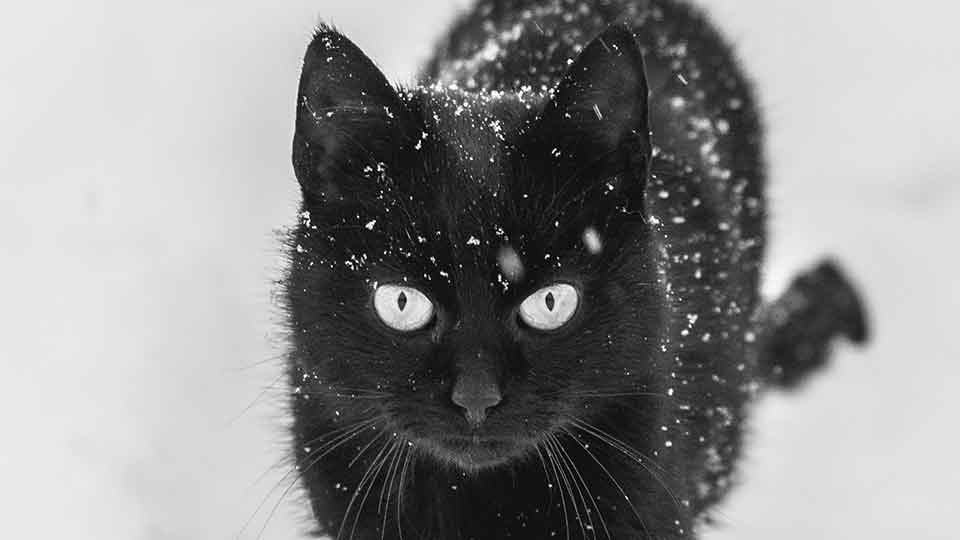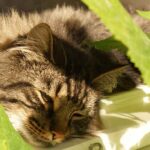Maine Coons are beautiful and majestic cats that can adapt well to cold weather, but they still need some special attention and care during the winter months.
In this post, I will share with you some tips and advice on how to keep your Maine Coon happy, healthy, and warm in winter.
Let’s get started!
Can Maine Coons Stay Outside In The Cold?
Maine Coons are one of the most cold-tolerant cat breeds, thanks to their thick, water-resistant fur, large paws, and bushy tails.
They can handle temperatures as low as 12°F (-11°C) for short periods of time, but they should not be left outside for too long when it’s freezing or below.
If your Maine Coon likes to go outside, you should always ensure they have easy access to a warm shelter, such as your house, garage, or a heated outdoor cat house.
You should also check on them regularly and bring them inside if they show any signs of discomfort or distress.
What Cold Temperature Can Cats Tolerate?
The answer to this question depends on several factors, such as your cat’s age, breed, fur, health, and body mass.
In general, cats have a higher body temperature than humans, around 100-102°F (38-39°C), and they need to burn more calories to maintain it.
Therefore, they are more sensitive to cold than we are.
According to the American Veterinary Medical Association, the ideal temperature range for cats in sheltered housing is between 50-80°F (10-27°C).
Anything below 45°F (7°C) is considered too cold for most cats, and anything below 32°F (0°C) can cause hypothermia or frostbite if they are exposed for too long.
However, some cats, like Maine Coons, can tolerate lower temperatures better than others because of their natural adaptations.
How To Tell If Your Maine Coon Is Cold?
Even though Maine Coons have a natural advantage over cold weather, they can still get cold and uncomfortable if the temperature drops too low or if they are wet or windy.
Some signs that your Maine Coon is cold include:
- Their skin, ears, paws, or nose are cold when you touch them.
- Their fur appears fluffed up more than usual and stays that way.
- They stay in a curled ball position with their tail and paws tucked under their body.
- They shiver or shake uncontrollably.
- They seek out warm places or objects, such as sunny spots, blankets, radiators, or your lap.
- They become lethargic, depressed, or unresponsive.
- They lose their appetite or thirst.
- They have difficulty breathing or have a low heart rate.
If you notice any of these signs in your Maine Coon, you should take immediate action to warm them up and prevent further complications.
How Do You Keep Your Maine Coon Warm?
There are several things you can do to keep your Maine Coon warm and cozy in winter. Here are some tips:
• Adjust the thermostat in your house to a comfortable level for your cat. You can also use a space heater or a fireplace to create a warm spot for your cat to relax in.
• Provide your cat with a warm and comfortable sleeping area. You can use a heated cat bed, a self-warming mat or a regular bed with extra blankets or pillows. You can also place the bed near a heat source or a window that gets sunlight.
• Feed your cat a high-quality diet that is rich in protein and fat. This will help them maintain their body heat and energy levels. You can also give them some extra treats or snacks in winter to boost their calorie intake.
• Make sure your cat has access to fresh and clean water at all times. Water is essential for hydration and temperature regulation. You can use a heated water bowl or a pet fountain to prevent the water from freezing or getting too cold.
• Consider putting a sweater or a coat on your cat if they go outside in cold weather. This will provide them with extra insulation and protection from the wind and snow. However, not all cats like wearing clothes, so you should only do this if your cat is comfortable with it. You should also avoid clothes that are too tight, too loose, or have buttons or zippers that can harm your cat.
• Trim your cat’s nails regularly to prevent them from cracking or splitting in the cold. You can also apply some paw wax or lotion to their paws to protect them from frostbite and mechanical injury. You should also clean their paws after they return from outside to remove any ice or snow.
How To Care Your Maine Coon In Winter
Taking care of your Maine Coon in winter is not very different from taking care of them in other seasons.
You need to pay more attention to their comfort and well-being and provide extra warmth and care.
Here are some things you should do to care for your Maine Coon in winter:
• Groom your Maine Coon regularly to keep their coat healthy and shiny. You should brush their fur at least once a week with a soft-bristle brush and a wide-tooth comb to remove loose hair, dirt, and debris.
You should also check for any mats or knots that can cause irritation or infection and remove them carefully with scissors or a mat remover.
• Bathe your Maine Coon only when necessary with a mild shampoo that is specially formulated for cats.
You should avoid bathing them too often, as it can dry out their skin and strip away their natural oils.
Also, dry them thoroughly with a towel and a hair dryer on a low setting to prevent them from getting cold or sick.
• Brush your Maine Coon’s teeth daily with a cat toothbrush and toothpaste to prevent dental problems and bad breath. Check their mouth for any signs of inflammation, infection, or injury and take them to the vet if you notice anything unusual.
• Clean your Maine Coon’s ears weekly with a cotton ball or a soft cloth moistened with a cat ear cleaner to remove any wax, dirt, or debris. You should also check their ears for any signs of irritation, infection, or parasites and take them to the vet if you notice anything abnormal.
• Take your Maine Coon to the vet at least once a year for a routine check-up, vaccination, and parasite prevention. You should also take them to the vet if you notice any changes in their behavior, appetite, weight, or appearance that may indicate an illness or injury.
Enjoy Your Maine Coon’s Company
Maine Coons are wonderful cats that can bring joy and happiness to your life.
They are loyal, affectionate, and playful companions that can brighten up your days.
They are also hardy and adaptable cats that can handle cold weather better than most breeds.
However, they still need your love and care to stay warm and comfortable in winter.
FAQ
Can Maine Coon survive in hot weather?
Yes, Maine Coon cats can survive in hot weather, but they need some special care and attention to stay comfortable and safe.
Maine Coons are originally from the cold climate of Maine, USA, and they have a thick, water-resistant coat that helps them regulate their body temperature and protect their skin.
However, this coat can also make them overheat in the summer, especially if they are exposed to direct sunlight, high humidity, or lack of ventilation.
To help your Maine Coon survive in hot weather, you should provide them with plenty of shade and water.
A water bowl placed in a cool, shady spot will help your Maine Coon stay hydrated and cool down.
You can also use a spray bottle or a damp cloth to mist or wipe your Maine Coon’s fur, as this will help them evaporate the excess heat.
You can also invest in a cooling mat or a fan for your Maine Coon to lounge on or near.
You should also pay attention to your Maine Coon’s coat and grooming.
You should brush your Maine Coon regularly to remove loose hair and prevent mats, as this will help them stay cool and comfortable.
You should also trim any excess hair that may bother your Maine Coon or interfere with their hygiene, such as around their eyes, nose, mouth, anus, and genitals.
However, you should not shave your Maine Coon’s coat completely, as this will expose their skin to sunburns and parasites.
Finally, you should monitor your Maine Coon for signs of heatstroke or dehydration.
If your Maine Coon is panting heavily, drooling excessively, vomiting, having diarrhea, or acting lethargic or confused, you should take them to a cool place immediately and contact your veterinarian.
Heatstroke can be fatal for cats if not treated promptly.
Can I keep a Maine Coon outside?
You can keep a Maine Coon outside if you have a safe and secure outdoor space for them to explore and play.
However, you should not leave them outside for too long or without supervision, as there are many dangers and risks that can harm them.
Some of the things that can threaten your Maine Coon outside are:
- Traffic: Cars can hit or run over your Maine Coon if they wander onto the road or get startled by loud noises.
- Predators: Larger animals such as dogs, coyotes, foxes, hawks, or owls can attack or kill your Maine Coon if they see them as prey or intruders.
- Parasites: Fleas, ticks, mites, worms, or other parasites can infest your Maine Coon’s fur or skin and cause itching, irritation, infection, or disease.
- Diseases: Viruses, bacteria, fungi, or other pathogens can infect your Maine Coon through bites, scratches, wounds, saliva, urine, feces, or other bodily fluids from other animals or contaminated sources.
- Poisons: Plants, chemicals, antifreeze, rat poison, or other substances can poison your Maine Coon if they ingest them accidentally or intentionally.
- Theft: People can steal your Maine Coon if they find them attractive or valuable.
- Loss: Your Maine Coon can get lost if they wander too far from home or get trapped in an unfamiliar place
To prevent these dangers and risks from harming your Maine Coon outside, you should follow these precautions:
- Spay or neuter your Maine Coon to reduce their urge to roam and mate with other cats.
- Microchip and collar your Maine Coon with an ID tag that has your name and contact information.
- Vaccinate and deworm your Maine Coon regularly to protect them from diseases and parasites.
- Provide your Maine Coon with a warm and comfortable shelter that has food, water, bedding, toys, and a litter box.
- Supervise your Maine Coon when they are outside and bring them inside at night or when the weather is bad.
- Consider using a harness and leash to walk your Maine Coon outside or a cat enclosure to contain them in a safe area
Following these precautions, you can keep a Maine Coon outside without compromising their safety and well-being.
What temperature should a Maine Coon cat be?
The normal body temperature of a healthy adult cat is between 100°F (37.8°C) and 102.5°F (39.2°C).
However, this may vary slightly depending on the cat’s age, breed, activity level, environment, and health condition.
- Kittens tend to have higher body temperatures than adult cats, ranging from 100°F (37.8°C) to 103°F (39.4°C).
- Maine Coons tend to have lower body temperatures than other cat breeds, ranging from 99°F (37.2°C) to 101.5°F (38.6°C).
- Active cats tend to have higher body temperatures than inactive cats, as they generate more heat through movement and metabolism.
- Outdoor cats tend to have lower body temperatures than indoor cats, as they are exposed to colder weather and lose more heat through their fur.
- Sick or injured cats tend to have higher or lower body temperatures than healthy cats, depending on the type and severity of their illness or injury
To measure the body temperature of your Maine Coon cat, you will need a digital thermometer that is designed for pets.
You can use either an ear thermometer or a rectal thermometer, depending on your preference and your cat’s tolerance. You should follow these steps:
- Turn on the thermometer and wait for it to be ready.
- Gently restrain your cat and calm them down with soothing words or treats.
- If using an ear thermometer, insert the tip into your cat’s ear canal and press the button. If using a rectal thermometer, lubricate the tip with petroleum jelly and insert it about an inch into your cat’s anus and press the button.
- Wait for the thermometer to beep or display the reading.
- Remove the thermometer and check the reading.
- Clean the thermometer with alcohol or soap and water and store it in a safe place
The normal body temperature of a Maine Coon cat is between 99°F (37.2°C) and 101.5°F (38.6°C).
If your cat’s temperature is above or below this range, you should contact your veterinarian for advice and treatment.







